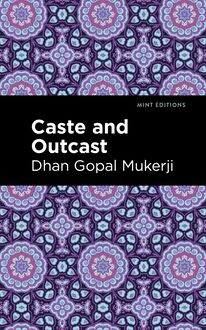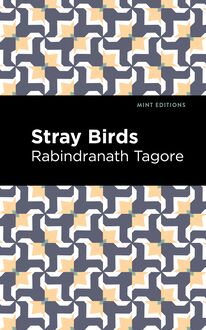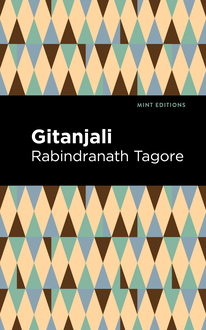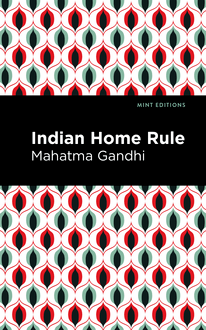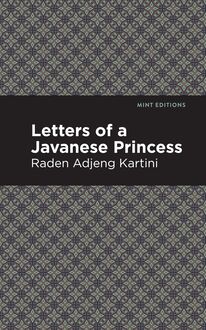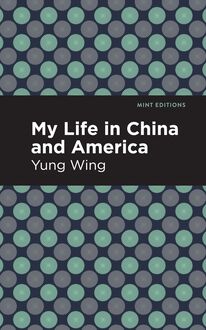-
 Univers
Univers
-
 Ebooks
Ebooks
-
 Livres audio
Livres audio
-
 Presse
Presse
-
 Podcasts
Podcasts
-
 BD
BD
-
 Documents
Documents
-
- Cours
- Révisions
- Ressources pédagogiques
- Sciences de l’éducation
- Manuels scolaires
- Langues
- Travaux de classe
- Annales de BEP
- Etudes supérieures
- Maternelle et primaire
- Fiches de lecture
- Orientation scolaire
- Méthodologie
- Corrigés de devoir
- Annales d’examens et concours
- Annales du bac
- Annales du brevet
- Rapports de stage
La lecture à portée de main
Vous pourrez modifier la taille du texte de cet ouvrage
Découvre YouScribe en t'inscrivant gratuitement
Je m'inscrisDécouvre YouScribe en t'inscrivant gratuitement
Je m'inscrisEn savoir plus
Vous pourrez modifier la taille du texte de cet ouvrage
En savoir plus

Description
Letters of a Javanese Princess (1921) is a collection of letters by Indonesian political activist and national hero Raden Adjeng Kartini. Written over the last several years of her life to friends and acquaintances in the Netherlands, Kartini’s letters illuminate the mind of a young woman with a deep understanding of the political and personal ramifications of injustice in her native Java.
For a young woman without access to a formal education, Raden Adjeng Kartini managed to combine a remarkable empathy for those suffering under an oppressive regime with an incredibly effective willpower to establish herself as a leading political thinker in her country. Decrying the influence of opium on Indonesia’s poor, she criticizes the influence of European civilization on its colonial possessions: “Civilization is a blessing, but it has its dark side as well. The tendency to imitate is inborn, I believe. The masses imitate the upper classes, who in turn imitate those of a higher rank, and these again follow the Europeans.” Not only is European influence a cause of cultural loss, it creates a demand, in one specific case, for such products as opium, pressuring the Indonesian government to allow its use and sale despite the harm it imposes upon its people. Throughout her letters, Kartini presents a nuanced, balanced critique of both Indonesian society’s oppressive treatment of girls and women—a lack of education, forced marriages—and the detrimental consequences of European conquest and cultural assimilation. Letters of a Javanese Princess is a powerful record of one woman’s commitment to many, an invaluable resource for scholars of colonialism, and a fascinating text for readers looking to familiarize themselves with the life of a national hero.
With a beautifully designed cover and professionally typeset manuscript, this edition of Raden Adjeng Kartini’s Letters of a Javanese Princess is a classic of Indonesian literature reimagined for modern readers.
Sujets
Informations
| Publié par | Mint Editions |
| Date de parution | 01 février 2021 |
| Nombre de lectures | 0 |
| EAN13 | 9781513275956 |
| Langue | English |
| Poids de l'ouvrage | 3 Mo |
Informations légales : prix de location à la page 0,0500€. Cette information est donnée uniquement à titre indicatif conformément à la législation en vigueur.
Extrait
Letters of a Javanese Princess
Raden Adjeng Kartini
Letters of a Javanese Princess was first published in 1920.
This edition published by Mint Editions 2020.
ISBN 9781513270951 | E-ISBN 9781513275956
Published by Mint Editions ®
minteditionbooks .com
Publishing Director: Jennifer Newens
Design & Production: Rachel Lopez Metzger
Translated By: Agnes Louise Symmers
Project Manager: Micaela Clark
Typesetting: Westchester Publishing Services
C ONTENTS I II III IV V VI VII VIII IX X XI XII XIII XIV XV XVI XVII XVIII XIX XX XXI XXII XXIII XXIV XXV XXVI XXVII XXVIII XXIX XXX XXXI XXXII XXXIII XXXIV XXXV XXXVI XXXVII XXXVIII XXXIX XL XLI XLII XLIII XLIV XLV XLVI XLVII XLVIII XLIX L LI LII LIII LIV LV LVI LVII LVIII LIX LX LXI LXII LXIII LXIV LXV LXVI LXVII LXVIII LXIX LXX LXXI LXXII LXXIII LXXIV LXXV
I
Japara, 25 May, 1899
I have longed to make the acquaintance of a “modern girl,” that proud, independent girl who has all my sympathy! She who, happy and self-reliant, lightly and alertly steps on her way through life, full of enthusiasm and warm feeling; working not only for her own well-being and happiness, but for the greater good of humanity as a whole.
I glow with enthusiasm toward the new time which has come, and can truly say that in my thoughts and sympathies I do not belong to the Indian world, but to that of my pale sisters who are struggling forward in the distant West.
If the laws of my land permitted it, there is nothing that I had rather do than give myself wholly to the working and striving of the new woman in Europe; but age-long traditions that cannot be broken hold us fast cloistered in their unyielding arms. Some day those arms will loosen and let us go, but that time lies as yet far from us, infinitely far. It will come, that I know; it may be three, four generations after us. Oh, you do not know what it is to love this young, this new age with heart and soul, and yet to be bound hand and foot, chained by all the laws, customs, and conventions of one’s land. All our institutions are directly opposed to the progress for which I so long for the sake of our people. Day and night I wonder by what means our ancient traditions could be overcome. For myself, I could find a way to shake them off, to break them, were it not that another bond, stronger than any age-old tradition could ever be, binds me to my world; and that is the love which I bear for those to whom I owe my life, and whom I must thank for everything. Have I the right to break the hearts of those who have given me nothing but love and kindness my whole life long, and who have surrounded me with the tenderest care?
But it was not the voices alone which reached me from that distant, that bright, that new-born Europe, which made me long for a change in existing conditions. Even in my childhood, the word “emancipation” enchanted my ears; it had a significance that nothing else had, a meaning that was far beyond my comprehension, and awakened in me an evergrowing longing for freedom and independence—a longing to stand alone. Conditions both in my own surroundings and in those of others around me broke my heart, and made me long with a nameless sorrow for the awakening of my country.
Then the voices which penetrated from distant lands grew clearer and clearer, till they reached me, and to the satisfaction of some who loved me, but to the deep grief of others, brought seed which entered my heart, took root, and grew strong and vigorous.
And now I must tell you something of myself so that you can make my acquaintance.
I am the eldest of the three unmarried daughters of the Regent of Japara, and have six brothers and sisters. What a world, eh? My grandfather, Pang è ran Ario Tjondronegoro of Demak, was a great leader in the progressive movement of his day, and the first regent of middle Java to unlatch his door to that guest from over the sea—Western civilization. All of his children had European educations; all of them have, or had (several of them are now dead), a love of progress inherited from their father; and these gave to their children the same upbringing which they themselves had received. Many of my cousins and all my older brothers have gone through the Hoogere Burger School—the highest institution of learning that we have here in India; and the youngest of my three older brothers has been studying for three years in the Netherlands, and two others are in the service of that country. We girls, so far as education goes, fettered by our ancient traditions and conventions, have profited but little by these advantages. It was a great crime against the customs of our land that we should be taught at all, and especially that we should leave the house every day to go to school. For the custom of our country forbade girls in the strongest manner ever to go outside of the house. We were never allowed to go anywhere, however, save to the school, and the only place of instruction of which our city could boast, which was open to us, was a free grammar school for Europeans.
When I reached the age of twelve, I was kept at home—I must go into the “box.” I was locked up, and cut off from all communication with the outside world, toward which I might never turn again save at the side of a bridegroom, a stranger, an unknown man whom my parents would choose for me, and to whom I should be betrothed without my own knowledge. European friends—this I heard later—had tried in every possible way to dissuade my parents from this cruel course toward me, a young and life-loving child; but they were able to do nothing. My parents were inexorable; I went into my prison. Four long years I spent between thick walls, without once seeing the outside world.
How I passed through that time, I do not know. I only know that it was terrible. But there was one great happiness left me: the reading of Dutch books and correspondence with Dutch friends was not forbidden. This—the only gleam of light in that empty, sombre time, was my all, without which, I should have fallen, perhaps, into a still more pitiable state. My life, my soul even, would have been starved. But then came my friend and my deliverer—the Spirit of the Age; his footsteps echoed everywhere. Proud, solid ancient structures tottered to their foundation at his approach. Strongly barricaded doors sprang open, some as of themselves, others only painfully half way, but nevertheless they opened, and let in the unwelcome guest.
At last in my sixteenth year, I saw the outside world again. Thank God! Thank God! I could leave my prison as a free human being and not chained to an unwelcome bridegroom. Then events followed quickly that gave back to us girls more and more of our lost freedom.
In the following year, at the time of the investiture of our young Princess, our parents presented us “officially” with our freedom. For the first time in our lives we were allowed to leave our native town, and to go to the city where the festivities were held in honour of the occasion. What a great and priceless victory it was! That young girls of our position should show themselves in public was here an unheard-of occurrence. The “world” stood aghast; tongues were set wagging at the unprecedented crime. Our European friends rejoiced, and as for ourselves, no queen was so rich as we. But I am far from satisfied. I would go still further, always further. I do not desire to go out to feasts, and little frivolous amusements. That has never been the cause of my longing for freedom. I long to be free, to be able to stand alone, to study, not to be subject to any one, and, above all, never, never to be obliged to marry.
But we must marry, must, must. Not to marry is the greatest sin which the Mohammedan woman can commit; it is the greatest disgrace which a native girl can bring to her family.
And marriage among us—Miserable is too feeble an expression for it. How can it be otherwise, when the laws have made everything for the man and nothing for the woman? When law and convention both are for the man; when everything is allowed to him?
Love! what do we know here of love? How can we love a man whom we have never known? And how could he love us? That in itself would not be possible. Young girls and men must be kept rigidly apart, and are never allowed to meet.
I AM ANXIOUS TO KNOW of your occupations. It is all very interesting to me. I wish to know about your studies, I would know something of your Toynbee evenings, and of the society for total abstinence of which you are so zealous a member.
Among our Indian people, we have not the drink demon to fight, thank God!—but I fear, I fear that when once—forgive me—your Western civilization shall have obtained a foothold among us, we shall have that evil to contend with too. Civilization is a blessing, but it has its dark side as well. The tendency to imitate is inborn, I believe. The masses imitate the upper classes, who in turn imitate those of higher rank, and these again follow the Europeans.
Among us there is no marriage feast without drinking. And at the festivals of the natives, where they are not of strong religious convictions, (and usually they are Mohammedans only because their fathers, grandfathers and remote ancestors were Mohammedans—in reality, they are little better than heathen), large square bottles are always kept standing, and they are not sparing in the use of these.
But an evil greater than alcohol is here and that is opium. Oh! the misery, the inexpressible horror it has brought to my country! Opium is the pest of Java. Yes, opium is far worse than the pest. The pest does not remain for ever; sooner or later, it goes away, but the evil of opium, once established, grows. It spreads more and more, and will never leave us, never grow less—for to speak plainly—it is protected by the Government! The more general the use of opium in Java, the fuller the treasury.
The opium tax is one of the richest sources of income of the Govern
-
 Univers
Univers
-
 Ebooks
Ebooks
-
 Livres audio
Livres audio
-
 Presse
Presse
-
 Podcasts
Podcasts
-
 BD
BD
-
 Documents
Documents
-
Jeunesse
-
Littérature
-
Ressources professionnelles
-
Santé et bien-être
-
Savoirs
-
Education
-
Loisirs et hobbies
-
Art, musique et cinéma
-
Actualité et débat de société
-
Jeunesse
-
Littérature
-
Ressources professionnelles
-
Santé et bien-être
-
Savoirs
-
Education
-
Loisirs et hobbies
-
Art, musique et cinéma
-
Actualité et débat de société
-
Actualités
-
Lifestyle
-
Presse jeunesse
-
Presse professionnelle
-
Pratique
-
Presse sportive
-
Presse internationale
-
Culture & Médias
-
Action et Aventures
-
Science-fiction et Fantasy
-
Société
-
Jeunesse
-
Littérature
-
Ressources professionnelles
-
Santé et bien-être
-
Savoirs
-
Education
-
Loisirs et hobbies
-
Art, musique et cinéma
-
Actualité et débat de société
- Cours
- Révisions
- Ressources pédagogiques
- Sciences de l’éducation
- Manuels scolaires
- Langues
- Travaux de classe
- Annales de BEP
- Etudes supérieures
- Maternelle et primaire
- Fiches de lecture
- Orientation scolaire
- Méthodologie
- Corrigés de devoir
- Annales d’examens et concours
- Annales du bac
- Annales du brevet
- Rapports de stage



